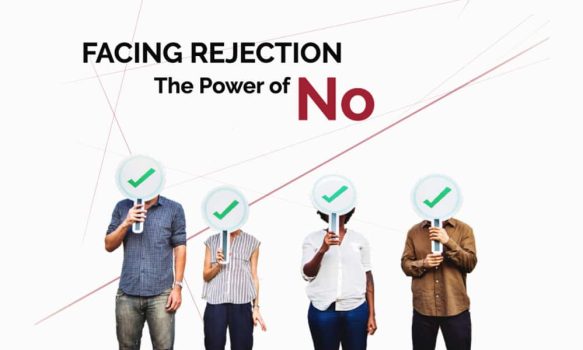This article is the first in a short series by Dr. Denry Machin on school admissions and marketing. This piece has a particular focus on the power of ‘no’.
Why do parents reject you?
That isn’t some existential interrogation, designed to probe your deepest childhood memories. This isn’t that kind of article. Rather, it is to ask why your potential customers (parents) don’t become actual customers (parents with children in your school).
At a recent marketing event for schools, conference participants were challenged to consider how to turnaround ‘rejecting’ parents. This kind of thinking is useful, necessary even. But, at its extremes, the implication is that those rejecting you might have been convinced otherwise. It suggests ‘no’ should (and can) be turned into ‘yes’. In some cases, this might be possible—a ‘no’ might become a ‘yes’. But, getting at least the occasional ‘no’ is inevitable, such is the cut-and-thrust of international schooling. Some parents will reject you.
What matters is what you do with the ‘no’.
Every ‘no’ should prompt some reflection on your marketing and, in particular, the admissions processes parents go through when choosing a school.
Imagine, for example, that a parent rejects you because you offer the IB Diploma and they wanted A-Levels. There is clearly a mismatch between your offer and the parent’s need. You can (and should), of course, try to convince them of the merits of IB, but rejection on this basis isn’t failure, it is just a fact of life—you don’t offer what they want.
Or, in contrast, imagine a parent rejects you because they misperceive how strong your sports programme is, a factor important in their decision making. At some point in the marketing process, you have failed to recognise the parent’s needs and to communicate your ‘value proposition’—you didn’t communicate how strong your sports programme actually is.
The latter is an error in marketing and the ‘no’ an important piece of feedback.
The Power of ‘No’
Given that some rejections are inevitable, you want them to come as early as possible in the admissions process. The sooner you get to ‘no’, the more you can focus on ‘yes’.
It is common to think of this process as moving a potential parent through the stages of Awareness, Interest, Demand/ Desire and Action (what salespeople call ‘AIDA’):
At the Awareness and Inform stages, your promotional materials should make it clear what type of school you are—and, by extension, what type of school you are not. You are filtering parents as much as they are filtering schools; if parents don’t want what you offer then an early ‘no’ protects everybody’s time.
If a prospective parent moves to the Interest stage, they will then start to consider your ‘enablers’. In short, do you offer what they are looking for: the right curriculum, the right location, at the right price and so on. They will have a sense of this from your marketing material, but here they are looking in more detail – via your prospectus, via your website, via your fee schedule and, most critically, via word-of-mouth.


However, every rejection at this stage should prompt the following reflection:
Did the parent say ‘no’ because of a mismatch between their enablers and your offering?
Can you address the mismatch? If not, then:
Do your materials clearly communicate the basics of what you offer and are they easily understood by parents, second- language English speakers especially?
Are you filtering the right parents for your school early in your marketing process?
By the Demand stage, and certainly if a parent visits you for a school tour, the right ‘enablers’ are probably in place. At this stage a ‘no’ is much more critical. If a parent rejects you it is much more likely that they might have been persuaded otherwise. You are a viable option for them but failed to address their ‘deciders’.
To avoid this, you should develop an idea of the family’s interests and needs, and you should build your tour around those needs. The task isn’t to tell nor to sell, it is to listen. You should listen to the family’s needs and respond to their questions. Find out what their deciders are and make sure that you address them – what will it take for them to say ‘yes’.
The Action part, if you get all of this right, and if you meet both the enablers and the deciders, is a new enrollee in your school.
Know your value
Why parents reject you is an important question to ask. However, rather than existential angst the answers should, hopefully, encourage more productive introspection. Knowing why parents say ‘no’ can encourage you to think differently about your marketing: are you effectively communicating your unique proposition; do parents value the same things as you offer?
The fundamental question is whether failures or inefficiencies in your marketing processes are causing rejections. Are you giving parents insufficient information at initial enquiry? Do your materials communicate clearly enough what type of school you are and what you offer? Are you proactively identifying parents’ needs and addressing their concerns, or are you just telling them about your school?
In these terms, every ‘no’ is a valuable piece of marketing data.
Written by Dr Denry Machin
Click here to read this article on the International Admissions Bulletin website.


![[COURSE] LinkedIn Advertising for Enrollment Managers](https://www.schoolhouse.agency/wp-content/uploads/2021/08/COURSE-LinkedIn-Advertising-for-Enrollment-Managers-1024x683.jpg)

![[WEBINAR] Live Show with the Portsmouth Christian Academy Team](https://www.schoolhouse.agency/wp-content/uploads/2021/08/WEBINAR-Live-Show-with-the-Portsmouth-Christian-Academy-Team.png)

